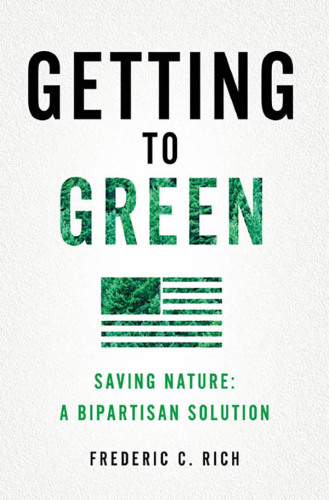
Getting to Green
Saving Nature: A Bipartisan Solution
کتاب های مرتبط
- اطلاعات
- نقد و بررسی
- دیدگاه کاربران
نقد و بررسی

February 8, 2016
No presidential administration has signed a major environmental bill since the Clean Air Act of 1990, says Rich (Christian Nation), a novelist, environmental activist, and former corporate lawyer, as he seeks the reasons behind such a failure in this straightforward volume. The historic bill, considered “a triumphant success for the Green movement,” also marked a “legislative dead end.” Rich cites a gulf between conservatives, who are “deeply suspicious” of and hostile toward environmentalist goals, and a Green movement often equally “hostile to business
and economic growth.” To bridge the gap, he argues that each side must work toward a “Center Green,” focusing “on that space where the values of right and left overlap.” Only then can they escape “hyperpartisan paralysis.” Reminding readers of the significant role conservatives have played in American environmentalism, Rich makes his case for forging beneficial partnerships between the two sides. Conservatives need to understand that climate change is real, he says, and they need to realize environmentalists are not elitists “whose goals come at the cost of jobs and economic growth.” Meanwhile, those in the Green movement must rein in skepticism “that any good can come from a for-profit corporation.” Rich makes some good points and maintains his optimism, but it’s difficult to see how groups so fundamentally at odds will find common ground.

Starred review from March 1, 2016
A corporate lawyer and conservation leader argues that only a new bipartisan coalition can end the legislative logjam facing the American environmental movement. Rich (Christian Nation, 2013)--a former partner at Sullivan & Cromwell, where he represented many oil and other multinational corporations as well as leaders in the national Land Trust Alliance--brings an understanding of both the corporate and environmental worlds to this fresh and welcome analysis of a green movement that "has lost its way." In a powerful opening, he notes that the last major environmental bill passed in the United States, the Clean Air Act of 1990, was a compromise based on a market approach, the kind of legislation not possible in today's polarized politics. The bipartisan consensus of the 1960s and 1970s (President Richard Nixon called environmentalism "a cause beyond party and beyond factions") fell apart with the Ronald Reagan revolution of the 1980s, leading to the present "Great Estrangement," with conservatives drifting rightward and environmentalists leftward. To repair the breach, conservatives must reassert their traditional leadership of conservation causes (a la Theodore Roosevelt) and temper their market fundamentalism. Greens have to learn to compromise, to tone down alarmist demands and offer a more hopeful vision, and to reform their mostly aging, white movement to win national support. Rich's call for change is sometimes wildly ambitious and seems especially unobtainable in light of current left-right debates, but his experience is unquestionably relevant. His frank views will leave both sides somewhat offended but will hopefully prove useful in teasing out the best impulses of both corporate and environmental leaders in the service of nature. All will certainly appreciate the author's thoughtful, sharp examination of issues that have prevented legislative action on climate change for two decades. As Rich notes, mobilizing even a "sufficient number" of moderates and conservatives can make a significant difference. Essential reading for anyone with a stake in the environmental debate.
COPYRIGHT(2016) Kirkus Reviews, ALL RIGHTS RESERVED.

Starred review from April 15, 2016
Whether liberal or conservative, anyone with a view on the environment will feel compelled to respond to this clear, thorough book. Corporate lawyer and conservationist Rich offers too much strong analysis to let anyone shrug this off, especially the Far Right market fundamentalists whom Rich refutes the most. His concise review of core conservative principles, particularly those of Edmund Burke, fillets the hypocrisy of those who offer antipathy to the environment, while he criticizes liberal promotion of politically doomed goals that have resulted in a woeful track record: no major environmental laws since the Clean Air Act of 1990. Rich also writes that arguments to save nature for its intrinsic value rather than human welfare mainly fuel the opposition. To engender debate, he suggests taking a small first step, rejecting the notion that such an incremental approach is merely an empty symbol or moral posturing. Rich promotes the view that conservation connects to traditional virtues and to good character. Regardless of scientific findings, for example, most people know it's imprudent to spew the sky with greenhouse gases. This informative, fair, probing, and heartfelt book should enliven all environmental debates.(Reprinted with permission of Booklist, copyright 2016, American Library Association.)

























دیدگاه کاربران